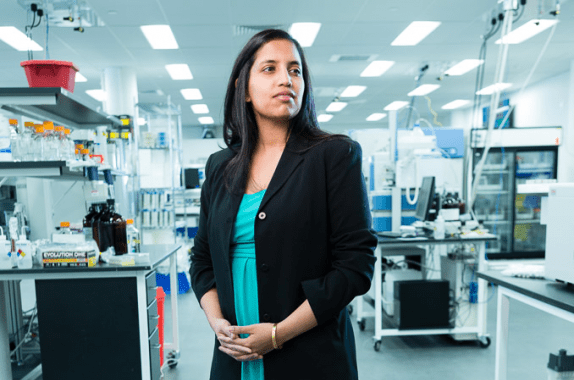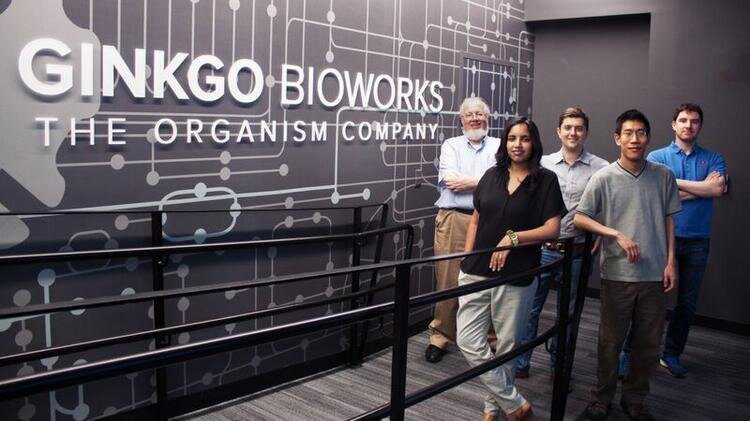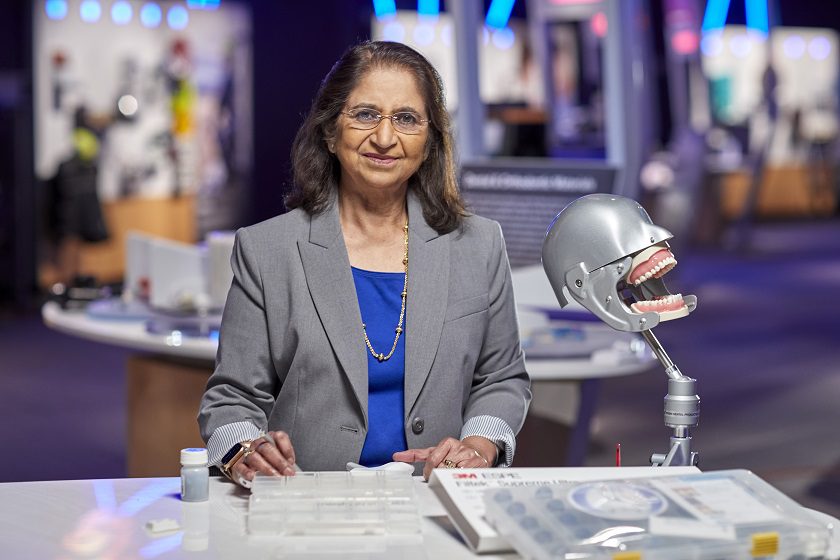(September 9, 2021) Back in 2008 when Ginkgo Bioworks was founded by a group of scientists from the prestigious Massachusetts Institute of Technology, it had one goal: to be able to engineer biology and ultimately build a factory for engineering organisms. Today, Ginkgo is the largest user of lab-printed DNA in the world and has over two dozen customers and 50 engineering projects across medicine, food, nutrition, cosmetics, agriculture and more. In the recent past, Ginkgo has been on the frontlines of COVID-19 research as well. And the woman behind it all, Reshma Shetty, was recently named in the Forbes list of America’s Richest Self-Made Women with a net worth of $750 million.
Shetty, who co-founed Ginkgo, with four others, including her husband Barry Canton, had never planned on turning an entrepreneur. However, over a decade later, her company has become an industry leader and Shetty has been the recipient of several awards and honors: Forbes named her as one of eight people inventing the future in 2008, in 2011 Fast Company named her one of 100 Most Creative People and in 2019, she bagged the Rosalind Franklin Award for Leadership in Industrial Biotechnology and Agriculture.
Wow #ThrowbackThursday https://t.co/VCjkdannQp
— Reshma Shetty (@reshmapshetty) September 2, 2021
Trailblazer in the making
Born into an Indian family, Shetty was raised in Utah and led a pretty normal childhood. She never really planned on becoming a founder. Her father, was a university professor, and inspired her passion for science, engineering, and math. However, it was during a high school research program on cone snails that Shetty realized that bioengineering was her true calling. She went on to graduate with a Bachelors in Computer Science from University of Utah in 2002 and went on to do her PhD in Biological Engineering from Massachusetts Institute of Technology. At the time, synthetic biology was just beginning to emerge. “There was this amazing frontier of all this work to be done, and not enough people to do it, which is a really exciting place to be as a researcher,” Reshma told The Petri Podcast.

Reshma Shetty
By the time this Global Indian had wrapped up her PhD, she decided to stick together with her friends from MIT and work towards expanding the horizons of biological engineering. One thing led to another, and the five decided to set up Ginkgo Bioworks. “Starting a company was really like a means to an end, not an end in itself,” she said. The company was completely bootstrapped to begin with: the five would take on part-time consulting gigs and ensure they maintained low overheads. Shetty and the group were able to love off $30,000 for five years while developing a strategy and plan to launch Ginkgo, which derives its name from a dinosaur era tree.
Bootstrapped to success
Ginkgo uses data analytics and robotics to speed up the process of discovering and making new organisms. It specializes in using genetic engineering to produce bacteria with industrial applications and designs organisms for customers across a range of industries. It is one of the largest privately held biotech companies in the world.
However, it wasn’t always a smooth ride for Shetty and her team. Soon after the company was founded, the global economy crashed; certainly not an ideal time to start a business or look for investment. This led to the founders coming up with creative ways to keep the company going. That’s how the group decided to bootstrap the company, which helped cement its place in the industry. Things began looking up when funding began flowing in. In its series B funding, Ginkgo managed to raise $45 million in one go. “That was more dollars dumped into our bank account at one instance than we ever had before. My thought was, ‘well pretty serious people with serious capital are choosing to take a bet on us’,” Shetty told Synbiobeta in an interview.
By 2017, Bayer chose to work with Ginkgo on engineering biologicals for agriculture. “It proved three things at the time. One, that engineered microbes in the environment could be a thing, that [they] could be a product category. There are serious people taking serious bets that we’re going to be able to release engineered microbes in the future. Two, that Ginkgo’s platform had value even in areas that we hadn’t previously been in. Three, it proved to the world that Ginkgo was really a platform company, that we weren’t simply going after a few products in the industrial biotech market.”
In a world affected by pandemic
With the COVID-19 pandemic ravaging the world, Ginkgo has been at the front line of the covid response. The company has been working on testing, therapeutics, and vaccine development and also helped push pooled testing for screening into places like schools to support them to safely reopen while preventing a further spread of the coronavirus.
Colleagues-turned-mentors
Although Shetty founded the company along with Tom Knight, Jason Kelly, Barry Canton, and Austin Che, she also considers all of them to be her mentors, saying she’s benefitted as much from them as from her supervisors through the years. “I’ve been really lucky in my experience at Ginkgo. My co-founders have all been tremendously supportive, and we’ve really operated as a team. My advice for women who are thinking about starting companies is to find a co-founding team who has your back. That’s the most important thing,” she told The Petri Podcast.
Though Shetty didn’t really set out to become an entrepreneur, she decided to start a company because it seemed like the best way to achieve her goal of making biology easier to engineer. In an interview with Huffington Post, she said, “I’d never try to encourage someone to become an entrepreneur. Instead, I would encourage them to figure out what they are passionate about, what they want to change about the world and what they want to achieve with their life. Then figure out the best way of making that happen.”





